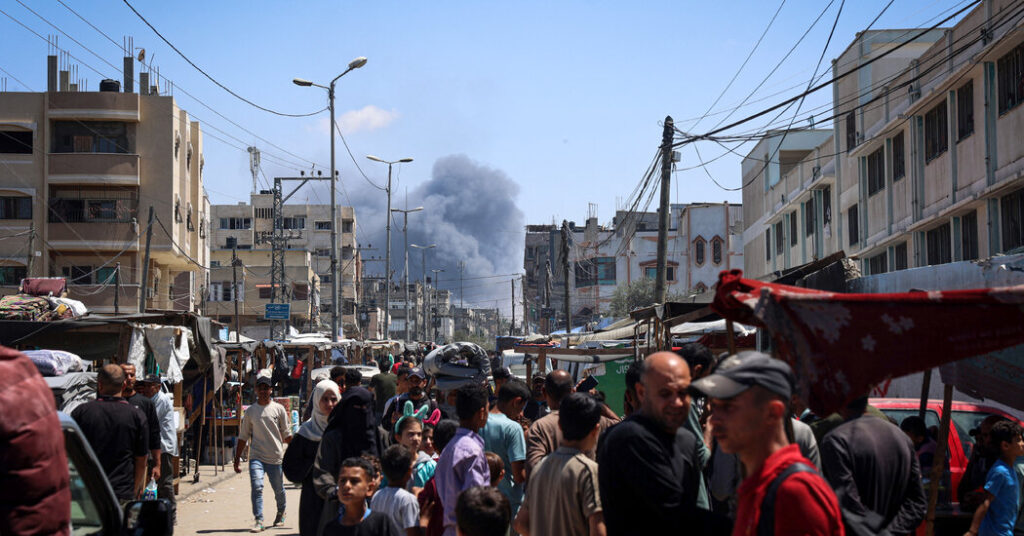Israeli officials said on Tuesday that major differences remained with Hamas over the latest proposal for a ceasefire in Gaza as delegations from both sides arrived in Cairo to resume talks.
Hamas said on Monday it had accepted the terms of a ceasefire proposed by Arab mediators, and U.S. officials said it had made minor wording changes to recent offers from Israel and the United States to the group.
But Israeli officials dispute that assertion, with Prime Minister Benjamin Netanyahu saying on Tuesday that his war cabinet agreed that proposals agreed to by Hamas were “far removed from Israel’s core demands.”
The text of the revised proposal circulated in Israeli news media on Tuesday and was confirmed by senior Hamas officials. A person familiar with the negotiations also described differences in the positions of the two sides. Here are the key takeaways:
‘Sustained calm’
The most substantial sticking point lies in a keyword that appears in the proposals approved by Israel and Hamas: the path to “sustainable calm.”
In the proposal approved by Israel and conveyed by Egypt to the Hamas leadership on April 26, both sides will work to achieve “sustainable calm” in Gaza after an initial six-week pause in fighting. The proposal leaves those two words open to interpretation.
But in the proposal approved by Hamas, the term is clearly defined as a permanent cessation of hostilities and the complete withdrawal of Israeli forces from the Gaza Strip.
Israel has consistently opposed any agreement that explicitly calls for a permanent ceasefire or an end to the war, and has said it will not agree to any deal until it believes its military attacks have achieved their goals. Ehud Yari, an Israel-based fellow at the Washington Institute for Near East Policy, said the Hamas timetable would commit Israel to ending the war while Hamas still holds hostages, depriving Israel of any leverage.
Experts say Israel may be willing to discuss ending the war later in the process, but it will not commit to doing so from the start.
“If you sign the agreement, you commit to everything,” Mr. Yari said.
Hostages released
The first phase of the three-phase deal is a six-week moratorium in fighting, during which Israel will exchange hundreds of Palestinian prisoners and detainees in Israeli prisons for 33 of the most vulnerable hostages being held in Gaza. These were women, including female soldiers, as well as elderly men and the sick and wounded. Israel lowered its initial demand for about 40 such hostages because it believed only 33 of the 132 hostages still being held in Gaza were still alive.
But Hamas told negotiators on Monday that not all of the 33 people released in the first phase were still alive and that the remains of the dead would also be released – news that surprised Israelis.
In addition, Hamas has proposed a framework that would extend the release of hostages, with three hostages released on the third day after the suspension begins, and three more every seven days thereafter. An earlier proposal called for the release of three hostages every three days.
Analysts said the longer release means negotiations on the second phase of the deal – to achieve “sustainable calm” – will proceed with Hamas holding more bargaining chips. Israelis are also concerned that the situation will increase the likelihood that more of the most seriously ill hostages will die before they are released.
Israel’s veto over prisoners
The proposal Israel agreed to in April would have allowed it to veto the release of some Palestinian prisoners serving life sentences from a list of 200 – prisoners expected to be exchanged for Israeli soldiers holding them hostage. The proposal approved by Hamas removes any such right of refusal by Israel.
The Israeli government has largely described the start of its ground operation in Rafah as a means of putting pressure on the group to soften its negotiating position. Hamas called the Israeli action a “dangerous escalation” aimed at “undermining mediation efforts to cease fire and release prisoners.”
However, White House spokesman John F. Kirby said both sides were sending delegations to Cairo on Tuesday for cease-fire talks and “there should be no reason why they cannot overcome these remaining differences.”
Julian E.Barnes, Adam Rasgon, Gabby Sobelman and Myra Novick Contributed reporting.

